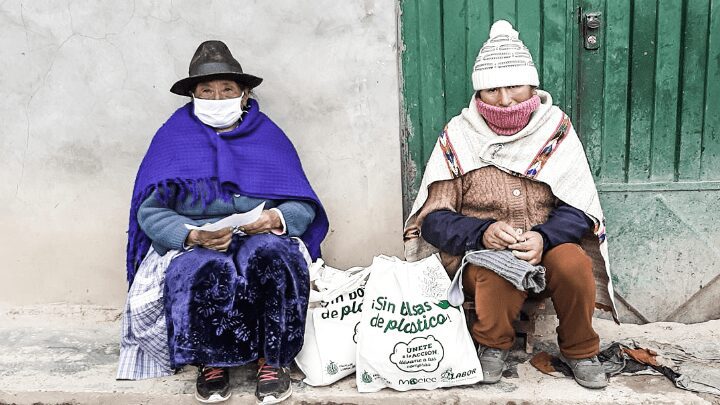

From the way we work and learn to the way we buy food and seek health care, the COVID-19 pandemic has affected Canadians in diverse and challenging ways. In the Global South, Development and Peace’s partners are also adapting to new challenges as the pandemic intensifies poverty, hunger, conflict and gender inequality.
Women around the world are already more vulnerable to domestic violence and food insecurity. The pandemic and its confinement measures have exacerbated these pre-existing realities. As caretakers and providers of food, many women are having to find ways to look after their families, even as they lose whatever precarious work they had and face the risk of catching the virus. Confinement has also rendered some women much more vulnerable to the risk of partner violence.
Women are thus on the frontlines of the pandemic, both because of its specific negative impacts on them and because they are stepping up to play vital roles in the pandemic response. Here are seven ways in which our partners report that women are affected by and responding to the pandemic:
- In Kutupalong, the world’s largest refugee camp, the virus is spreading among nearly one million Rohingya who fled persecution in Burma and are now living in crowded shelters in Bangladesh. With the camp on lockdown, only essential services like food distribution, sanitation and urgent health services are allowed. Our partner, Caritas Bangladesh, has a network of mostly women volunteers who are going door-to-door to raise awareness about the pandemic and emphasize the importance of handwashing and physical distancing in the crowded camp where water and space are scarce. These educators are among the few sources of reliable information because the Bangladeshi authorities have cut off Internet access in the camp. They dispel misinformation such as a rampant rumour that those seeking help for COVID-19-like symptoms are being isolated and possibly killed. Having been chased out of their country and had family members violently killed, some Rohingya are susceptible to this rumour, which deters them from disclosing symptoms or seeking help. By informing people and connecting them to resources, the women are helping reduce the spread of the virus and ensuring that those who need treatment receive it.
- Host communities in Cox’s Bazar, Bangladesh, have long faced natural disasters, malnutrition and poverty. The influx of Rohingya refugees has sent food and commodity prices skyrocketing, adding to their struggles. Being usually responsible for acquiring and cooking food, women often go hungry so their families can have the little food they collect. In addition, female-headed households tend to suffer more often from hunger because they have less income and rely on precarious labour. Development and Peace was supporting a Caritas Bangladesh project that boosts women’s livelihoods through community gardens, poultry-raising and small shops, all of which were suspended because of the pandemic. We are now supporting the provision of cash assistance for three months, so that the women micro-entrepreneurs can maintain their assets and not fall back into extreme poverty.
- Our partner, Centro Labor, works with the Andean community of Cerro de Pasco, Peru, where the air, water and land are contaminated by heavy metals from mining. This contamination is now even present in people’s bloodstreams, causing several chronic health issues. As primary caregivers to extended family members, the community’s immunocompromised women are at higher risk of infection as they are caring for those with COVID-19. Centro Labor has distributed food and hygiene kits to some of the most vulnerable communities and is doing all it can to share health information to combat the pandemic in Peru, which is already South America’s second-worst-affected country.
- In Brazil, Honduras, the Philippines and other countries, the pandemic is further threatening the lives of human rights defenders as lockdowns provide some unscrupulous officials the opportunity to repress them. Many of the human rights defenders are women who face the risk of sexual and other forms of violence during often arbitrary detentions. In Honduras, our partners helped save a woman water rights defender whose life was threatened by cartels by enrolling her in a government protection program. In her case, the lockdown had a protective effect. Elsewhere, lockdowns have allowed powerful interests to threaten and harm human rights defenders with greater impunity.
- In parts of Somalia, our partner, Trocaire, is the main provider of health care to host communities and displaced people. Because violence can erupt at any time and the testing centre in Mogadishu is hundreds of miles from most communities, Somalia is ill-equipped to respond to the pandemic. By adding services to care for those quarantined due to COVID-19, Trocaire is lessening the caregiving burden and risk of transmission for many women. Women educators are also going door-to-door to educate people about COVID-19 prevention and to identify and refer potential COVID-19 patients to clinics.
- In Haiti, the pandemic is increasing the risk of a famine. To feed their families, many Haitian tradeswomen, known as “madam sara” in Creole, buy produce in rural areas and travel to cities to sell it to market sellers. The wide travel and close interpersonal interactions that their trade requires places the madam sara at elevated risk of catching and transmitting the virus. Development and Peace’s COVID-19 fund is helping Caritas Haiti provide food aid and pandemic prevention and care information to these women and their communities.
- In the port town of Jacmel in southern Haiti, Fanm Deside protects women and girl victims of domestic violence and advocates for their rights. As confinement and the fear of transmission make women more vulnerable to partner violence, Fanm Deside continues ensuring that they have safe spaces in which to self-isolate.
Around the world, Development and Peace’s partners are responding to the pandemic and striving for a just recovery. Now more than ever, we need your generosity so that we can continue to support their essential work for justice and peace.

